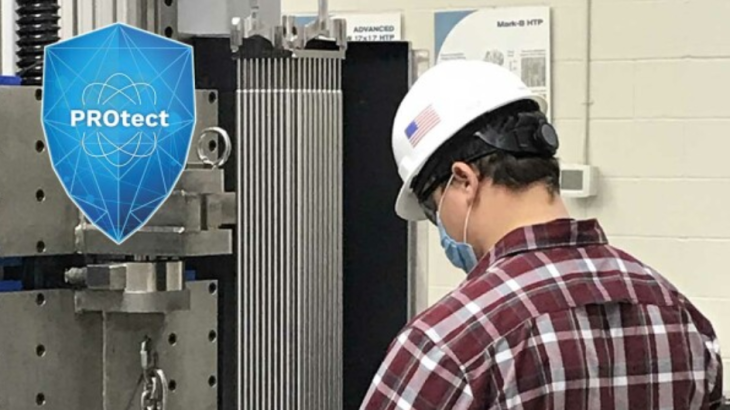First 'complete' Framatome ATF assembly loaded in PWR
Framatome announced its first 100% accident tolerant fuel (ATF) assembly has been delivered to Exelon Generation's Calvert Cliffs nuclear power plant in Maryland, USA. The assembly - described by the company as a nuclear industry "first" - was loaded into one of the plant's two pressurised water reactors during a recent refuelling outage.

(Image: Framatome)
The lead fuel assembly (LFA) contains 176 chromium-coated rods and chromia-enhanced pellets, and was developed with funding from the US Department of Energy (DOE) under Framatome's PROtect programme. The complete ATF assembly builds on previous work that included completing an 18-month fuel cycle test on LFA in the USA and Switzerland.
"Loading the first complete accident tolerant fuel assembly is a huge milestone for Framatome and the nuclear energy industry," said Lionel Gaiffe, senior executive vice president of Framatome's Fuel Business Unit.
The first complete fuel assembly builds on previous work that included completing an 18-month fuel cycle test on an LFA in the USA and Switzerland. The assembly was fabricated at Framatome's manufacturing facility in Richland, Washington, as part of a 2019 contract with Exelon Generation.
ATF designs aim to enhance performance during normal operations at nuclear power plants and provide operators with more time to respond in the event of loss of active cooling. Such fuel may incorporate the use of new materials and designs for cladding and fuel pellets. Framatome, GE/GNF and Westinghouse are all developing ATF concepts for light-water reactors, with the help of funding from the DOE, and Russian fuel company TVEL is developing ATF for use in Rosatom's VVER reactors and in western PWRs.
Framatome says its PROtect ATF chromium-coated cladding and chromia-enhanced pellets are more tolerant to changes in reactor core temperatures increasing coping time, while reducing corrosion and the production of hydrogen under high-temperature conditions.
"The use of this fuel demonstrates our continued commitment to innovation and to identifying new technologies that will enhance reliability while maintaining our exceptional operational and performance standards," Calvert Cliffs site vice president Tom Haaf said.
Researched and written by World Nuclear News
- China Institute of Atomic Energy
- Nuclear Power Institute of China
- Southwestern Institute of Physics
- China Nuclear Power Operation Technology Corporation, Ltd.
- China Nuclear Power Engineering Co., Ltd.
- China Institute for Radiation Protection
- Beijing Research Institute of Uranium Geology (BRIUG)
- China Institute of Nuclear Industry Strategy (CINIS)
- China Nuclear Mining Science and Technology Corporation


